36 Arguments for the Existence of God - [52]
, a book which, I am not embarrassed to say, I quote at every opportunity, such an impression it has personally made on my way of thinking. And now, when I am squeezed-I know you’ll understand me, with someone like you I don’t have to spell it out-with my own visions for Frankfurter on one side and other considerations on the other, what do I learn but that the jewel is in danger of being snatched up by the grasping hands of Harvard University? What’s the matter, they don’t have enough big shots there, they have to try to take away the little that we have?”
The transformation that has come over Shimmy is extraordinary. He looks fragile, vulnerable, like someone whose childhood was spent dodging Cossacks in Poland rather than picking oranges and carrying an Uzi in a kibbutz outside of Jerusalem.
“So tell me, my friend, what do I have to do to keep you from going over to those shmendriks up the river?”
XI The Argument from Transcendental Signifiers
The large suite of offices assigned to the Department of Faith, Literature, and Values had been part of Frankfurter’s enticement package to Jonas Elijah Klapper and were intended to be used for the international scholars he was authorized to invite with the generous discretionary funds the university had provided him. Jonas had used these offices for storage rooms, having Miriam Chan file the massive amounts of written matter that he had accumulated over the years. Jonas had saved everything for posterity, an inestimable boon for the future generations of scholars who would study him. His Nachlass reached all the way back to the wide-ruled machberet, the notebook in which he had formed his first Hebrew letters.
Miriam was a methodical and efficient young woman, but the task was daunting, especially since Professor Klapper tended to snatch whatever she was about to file out of her hands, so that he could peruse it and share the background with her, such as the fact that when he arrived as a first-grader at P.S. 2 on Henry Street, on the Lower East Side (named the Meyer London School, after one of the founders of the Socialist Party of America and the first elected socialist congressman: there had followed a digression), he knew how to read, although nobody had taught him, certainly not his mother, who remained a stranger to the English language.
“How I came by the knowledge remains to this day shrouded in mystery,” he whispered to Miriam.
Also mysterious was how everything about his cramped Columbia office had been preserved, right down to the spiky plant on the windowsill, which had been dead for years. The very arrangement of the clutter on Professor Klapper’s desk was duplicated, with space cleared for the photograph of his mother in its ornate silver frame. The wooden-slatted chair into which he was poured was either an exact replica of what he’d had at Columbia or had been transported along with the desiccated crown of thorns.
There were times when a student, sequestered with the professor, would encounter him in a rare mood of confidentiality, as if Jonas Elijah Klapper were suddenly made aware of the loneliness of his loftiness, grown weary of the constant burden of delivering himself ex cathedra. The realization would leave him eager to talk as others do, personally and intimately. The identity of the student was inconsequential. One simply had to be there when the mood struck, and today was Cass’s lucky day.
“I am not a preterist-that is, one whose chief interest and delight are in the past. As must anyone who regards with seriousness the es-chatological idea that scaffolds the strata of the greater metaphysics, I point my face resolutely toward the future. And yet the past-I speak here of the personal past-has a power over the present. The past haunts the present with the taunt of what is gone. As Tennyson so irrefutably put it, ‘And Time, a maniac scattering dust, / And Life, a Fury slinging flame.’”
The last line was whispered in a voice so tremulous and faint that Cass wasn’t certain whether the last word was “flame” or “fame.”
Cass was here, by appointment, to plot the course of his study for the next few years. Professor Klapper was insistent that his graduate students not be required to take any of their courses in other Frankfurter departments. Indeed, he strongly warned against it. But since he was the solitary professor in the Department of Faith, Literature, and Values, and since he taught only one seminar a semester, the professor’s position had presented the dean of graduate students with a technical problem-to wit, how are the students in this department to fulfill the course requirements for the Ph.D.? The problem for now related only to Cass Seltzer, since the other Klapper students had long ago fulfilled their course requirements. The plan arrived at was that there would be an extensive syllabus, still to be constructed, that would cover all the best that had been written regarding faith, literature, and values. Cass had already embarked on faith. Professor Klapper had assigned him

В книге рассказывается история главного героя, который сталкивается с различными проблемами и препятствиями на протяжении всего своего путешествия. По пути он встречает множество второстепенных персонажей, которые играют важные роли в истории. Благодаря опыту главного героя книга исследует такие темы, как любовь, потеря, надежда и стойкость. По мере того, как главный герой преодолевает свои трудности, он усваивает ценные уроки жизни и растет как личность.

В книге рассказывается история главного героя, который сталкивается с различными проблемами и препятствиями на протяжении всего своего путешествия. По пути он встречает множество второстепенных персонажей, которые играют важные роли в истории. Благодаря опыту главного героя книга исследует такие темы, как любовь, потеря, надежда и стойкость. По мере того, как главный герой преодолевает свои трудности, он усваивает ценные уроки жизни и растет как личность.

В книге рассказывается история главного героя, который сталкивается с различными проблемами и препятствиями на протяжении всего своего путешествия. По пути он встречает множество второстепенных персонажей, которые играют важные роли в истории. Благодаря опыту главного героя книга исследует такие темы, как любовь, потеря, надежда и стойкость. По мере того, как главный герой преодолевает свои трудности, он усваивает ценные уроки жизни и растет как личность.

В книге рассказывается история главного героя, который сталкивается с различными проблемами и препятствиями на протяжении всего своего путешествия. По пути он встречает множество второстепенных персонажей, которые играют важные роли в истории. Благодаря опыту главного героя книга исследует такие темы, как любовь, потеря, надежда и стойкость. По мере того, как главный герой преодолевает свои трудности, он усваивает ценные уроки жизни и растет как личность.

Тюрьма на севере штата Нью-Йорк – место, оказаться в котором не пожелаешь даже злейшему врагу. Жесткая дисциплина, разлука с близкими, постоянные унижения – лишь малая часть того, с чем приходится сталкиваться юным заключенным. Ори Сперлинг, четырнадцатилетняя балерина, осужденная за преступление, которое не совершала, знает об этом не понаслышке. Но кому есть дело до ее жизни? Судьба обитателей «Авроры-Хиллз» незавидна. Но однажды все меняется: мистическим образом каждый август в тюрьме повторяется одна и та же картина – в камерах открываются замки, девочки получают свободу, а дальше… А дальше случается то, что еще долго будет мучить души людей, ставших свидетелями тех событий.

Я был примерным студентом, хорошим парнем из благополучной московской семьи. Плыл по течению в надежде на счастливое будущее, пока в один миг все не перевернулось с ног на голову. На пути к счастью мне пришлось отказаться от привычных взглядов и забыть давно вбитые в голову правила. Ведь, как известно, настоящее чувство не может быть загнано в рамки. Но, начав жить не по общепринятым нормам, я понял, как судьба поступает с теми, кто позволил себе стать свободным. Моя история о Москве, о любви, об искусстве и немного обо всех нас.